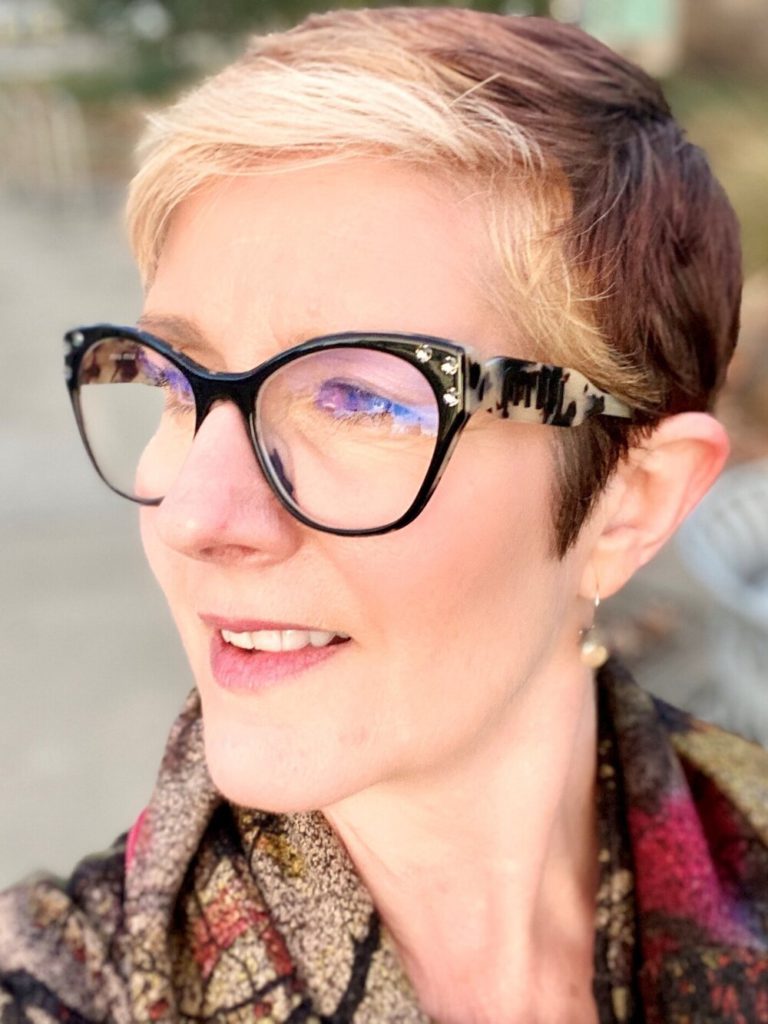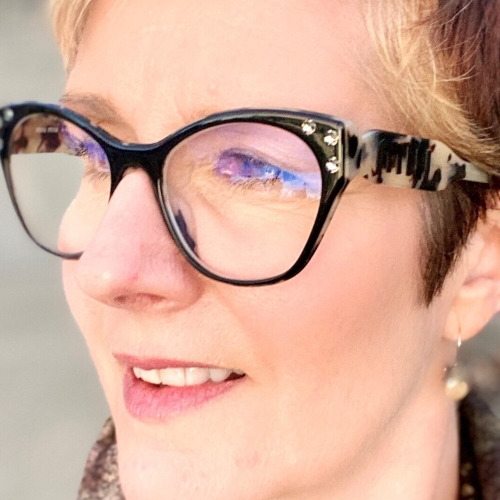A Conversation with a Personal & Professional Caregiver

My dad passed away in May 2019 from cancer. Part of me wanted to just crawl into bed and not get up. There was another part of me that was incredibly driven, though, because I know firsthand why this work that we’re doing is so important.
I knew why somebody needed someone to answer those phone calls and emails.
Kris Curl Johnston
As a professional caregiver, there’s a line. Essentially, the line is that you don’t matter. You are there for these individuals. That is a part of the professional code. ”
- Name: Kris Kurl Johnston
- Title:
- Sacramento Citywide Oncology Phase I program (SCOPE)
- Program manager
- Sacramento Citywide Oncology Phase I program (SCOPE)
- Philosophy: There is a line between personal and professional. Kris takes her personal caregiving experiences and uses them when helpful and relevant in her professional caregiver position.
This interview has been edited for clarity. This is not medical advice. Please consult with your healthcare provider for treatment decisions.
Background
Your work as a clinical program manager
We have a very unique program where we work very closely with our community oncologists in the region. They all perform clinical research themselves, but they’re not equipped to do the very early stage clinical trials. We are their phase I center and I am their primary contact.
We also have the Scope website. Some oncologists will call about a trial, but others will just have their patients call or go to the website. When working with the physicians, I’m their primary contact for the inquiries that come through the website.
I also have many other duties including program development and triaging and overseeing clinical trial inquiries.
Your background
After I graduated from UC Davis with my bachelor’s degree, I got a job doing medical records for pediatric oncology. I worked my way up. I started training for clinical research.
Pediatrics was very challenging. My hats are off to the pediatric oncologists and nurses.
I jumped to adults. I continued my training here at the UC Davis Cancer Center. At that time, clinical research coordination was very low-paying. My student loans were coming due. Then, I got recruited into the pharmaceutical industry. I really enjoyed it, but it got to the point where I was on planes every day.
When I decided to get married and have a kid, that wasn’t really an option anymore, so I came back to UC Davis, and I’ve been here since.
Being a Personal Caregiver
Can you talk about your experience as a personal caregiver
I went with my aunt to her appointments when she was diagnosed. We got her medications and went over all the antiemetics (drugs) and how to take them because I was going to have to be out of town all weekend.
There are very specific directions to how you take those drugs that keep you from throwing up constantly, so I wanted to make sure she knew how to take them.
She was nodding and saying, “Yup. Yep. Okay. Yeah.” I had absolutely no idea to what degree she was not getting it. I set up a nurse friend to be on call in case she needed anything while I was gone.
I came back to town on that Monday, and I got a call from my aunt. “Are you back in town?” She sounded awful. I said, “Yeah, what’s going on?”
She didn’t get any of it. She didn’t take any of her medication right. She had been so sick all weekend and didn’t call anybody because she didn’t want to be a bother.
Helping a patient
As a caregiver, even though you have this amazingly competent person you’ve watched and admired all your life, when it comes to their own diagnosis and medications, they might not be on top of it.
You have to watch out for that and make sure they understand what to do.
Caregiving a second time
Right after my aunt finished her treatment, my dad was diagnosed. I work with all these oncologists in the area, and I have all their cell phone numbers because we’re texting back and forth about their patients.
When my dad ended up with a recurrence, he was hospitalized at a smaller rural hospital. They kept saying, “It’s just a bowel obstruction, don’t worry.” I said, “There was a scan that was just done. Can we get that?”
They didn’t even know where to go to get it. I needed answers. I was getting frustrated.
I thought, “I know the oncologist downstairs. I should go get them.” I didn’t though. I called the oncologist down here in the valley, and I let her know what was going on in a message. She essentially scolds me for not using her cell phone and for not walking downstairs to get that other oncologist I knew.
I felt like I was going to be taking advantage of those professional relationships. I was scolded for not taking advantage of it, and I thought that was amazing.
Navigating the caregiving relationship as the child of a patient
The other thing I realized was just how much my dad wouldn’t tell me because I was his daughter. I had to tell him, ‘Dad, I’m going to cry sometimes. You still have to tell me what’s going on.’
I had to make him understand that I needed to know what was going on so I could get him the help he needed. That’s very common and very difficult in adult child caregiver dynamics.
Advice for other adult child caregivers
It’s a very individual thing. My aunt, who had cancer and is my dad’s sister, had things she knew she couldn’t handle hearing regarding her brother. She avoided them.
We can all take a lesson from her. You have to know yourself well enough to know what you can and can’t take. If you can’t take hearing something painful, get another family member or friend involved.
In my case, with my dad, I could take it. I knew I could handle it. I just had to assure my dad that even if I cried, it didn’t mean I wasn’t handling it. You have to know what you can take in the moment.
Be very open and honest with the professional caregiver. I was very open with my dad’s oncologist and nurses. I said, ‘Look. He may not tell me everything. He may not tell you everything. Let’s compare notes.’
Asking for help outside of the oncologist
Remember that the oncologist is only going to treat the cancer. If the patient has pain, depression, or anything else going on, they’re not treating that. Ask for a referral.
The oncologist doesn’t specialize in other areas of medicine and sometimes they forget to ask. Speak up. They’re happy to refer you to someone who can help.
An extremely important question you can ask is, “Is there any other support we can seek out here?” Most institutions have social workers, navigators, and support programs.
Professional Caregiving
There’s a line between personal and professional caregiving. Can you talk about how it blurred for you?
As a professional caregiver, there’s a line. Essentially, the line is that you don’t matter. You are there for these individuals. That is a part of the professional code.
The challenge is that the professionals end up burning out because we get so good at pushing ourselves to the side in order to keep a clear head, that we lose ourselves.
My dad passed away in May 2019 from cancer. Part of me wanted to just crawl into bed and not get up. There was another part of me that was incredibly driven, though, because I know firsthand why this work that we’re doing is so important. I knew why somebody needed someone to answer those phone calls and emails.
I found that I went from never drinking to drinking every day. I was tempted to take some of my son’s ADHD medication so I could keep the necessary pace of our days. Early stage research is only for people with advanced cancers, which means every phone call is an emergency. We have to move quickly.
There’s this weird mix of personal and professional conflict within myself because I am a professional, but this work affects me personally. So, I’m taking these calls from people who are saying, “You have no idea what we’re going through.”
When I decided to breach that professional line just enough to say, ‘No, we do know exactly what you’re going through,’ I found that they could breathe again.
Cancer doesn’t discriminate. It can impact anyone personally. It’s very important for patients and caregivers to remember that we’re all in this together and we understand. ”
How can caregivers combat burnout?
It was monumental for me to recognize burnout and to label it. I had to realize I’m not a wimp, and it’s a real thing. The mechanism by which it happens is forgetting that you exist as a human being.
Remember that you are an individual, no matter how much or how often you put yourself on a shelf to care for other people.
Then, it’s about keeping little goals just for yourself and celebrating every moment. Labeling it, remember I am an individual who is important, and maintaining little goals just for me are the three things that brought me back.
Always keep a little bit of you whether you are a personal or professional caregiver. It’s okay to blur the lines a little to make a human connection. That will help you navigate this more than anything else.
Recognizing burnout
I was trying to come back from the edge. I found myself having a drink at lunch and hoping no one smelled it on me when I got back to work. I knew something had to give.
I coordinate some of the professional education for our group, so I had requested the chief wellness officer for the health system to come in to speak to us. He usually talks to physicians, but he was happy to come talk to us because he was curious to see how burnout in physicians translated to us.
He came in and discussed it. It was not only an “a-ha!” moment for me, but for so many of us. Afterwards, I went up and talked to him and some others. The feedback I got was, “Oh my god, I’m burnt out,” from so many of us.
We all learned we have to bring ourselves back a little bit more every single day.
Advice about clinical trials
Clinical trials are not just for people with no other options.
Without clinical trials, we have no new treatment. Many clinical trials actually require no prior therapy or only one prior therapy. There are eligibility requirements, so it’s important for patients to discuss trials with their physician.
The most important thing is to realize that clinical trials are simply another treatment option. Once you realize that, it’s about talking with your oncologist who’s treating you. Ask. ‘What about clinical trials?’
A lot of times there are clinical trials going on with the doctor who is treating you. If not, start at the biggest academic center near you. Find the phone number for clinical trials. Call. Go to their website. You don’t want to be flying somewhere and having to find a place to live if you don’t have to. Find one near you where you can live at home or with a relative.
There are websites and services out there like the American Cancer Society and other organizations with clinical trial matching programs. It’s important to speak with someone to ensure the information is up to date.
